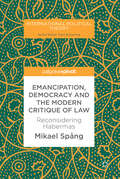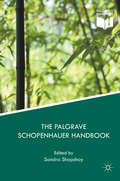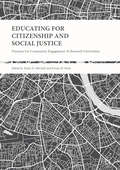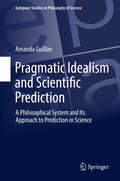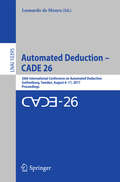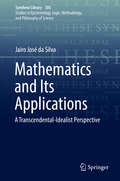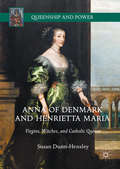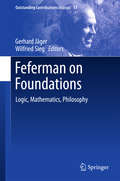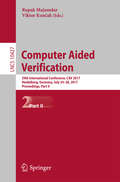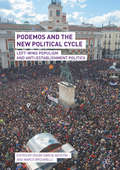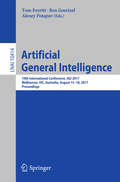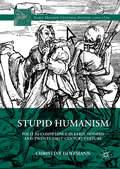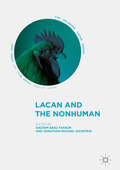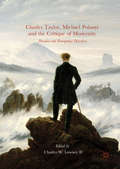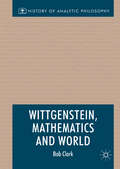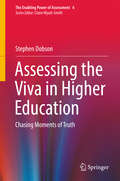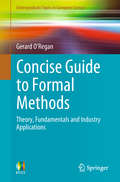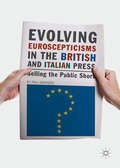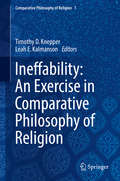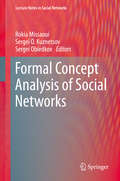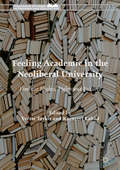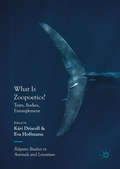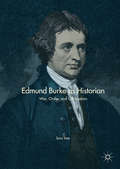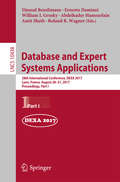- Table View
- List View
Emancipation, Democracy and the Modern Critique of Law: Reconsidering Habermas (International Political Theory)
by Mikael SpångThis book focuses on Jürgen Habermas’ theorising on law, rights and democracy in light of the modern critique of law. The latter tradition, which goes back to Hegel and Marx, has addressed the limitations of rights as vocabulary of emancipation and law as language of autonomy. Since Habermas claims that his reconstruction of private and public autonomy has an emancipatory aim, the author has chosen to discuss it in the context of the modern critique of law. More specifically, the study addresses the need to consider the dialectic of law, in which law is both a condition for emancipation and domination, when discussing what law and rights permit. It will appeal to students and scholars across the fields of political theory, law and legal criticism, as well as sociology and sociology of law.
The Palgrave Schopenhauer Handbook
by Sandra ShapshayThis comprehensive Handbook offers a leading-edge yet accessible guide to the most important facets of Arthur Schopenhauer's philosophical system, the last true system of German philosophy. Written by a diverse, international and interdisciplinary group of eminent and up-and-coming scholars, each of the 28 chapters in this Handbook includes an authoritative exposition of different viewpoints as well as arguing for a particular thesis. Authors also put Schopenhauer's ideas into historical context and connect them when possible to contemporary philosophy. Key features: Structured in six parts, addressing the development of Schopenhauer's system, his epistemology and metaphysics, aesthetics and philosophy of art, ethical and political thought, philosophy of religion and legacy in Britain, France, and the US. Special coverage of Schopenhauer's treatment of Judaism, Christianity, Vedic thought and Buddhism Attention to the relevance of Schopenhauer for contemporary metaphysics, metaethics and ethics in particular. The Palgrave Schopenhauer Handbook is an essential resource for scholars as well as advanced students of nineteenth-century philosophy. Researchers and graduate students in musicology, comparative literature, religious studies, English, French, history, and political science will find this guide to be a rigorous and refreshing Handbook to support their own explorations of Schopenhauer's thought.
Educating for Citizenship and Social Justice
by Krista M. Soria Tania D. MitchellIn this edited volume, authors explore the ways in which departments, programs, and centers at public research universities are working to better engage students in the work of citizenship and social justice. The chapters in this book illuminate the possibilities and challenges for developing community engagement experiences and provide evidence of the effects of these efforts on communities and undergraduate students' development of citizenship outcomes. This text reveals how important the integration of our intentions and actions are to create a community engaged practice aimed towards justice.
Pragmatic Idealism and Scientific Prediction
by Amanda GuillánThis monograph analyzes Nicholas Rescher’s system of pragmatic idealism. It also looks at his approach to prediction in science. Coverage highlights a prominent contribution to a central topic in the philosophy and methodology of science. The author offers a full characterization of Rescher’s system of philosophy. She presents readers with a comprehensive philosophico-methodological analysis of this important work. Her research takes into account different thematic realms: semantic, logical, epistemological, methodological, ontological, axiological, and ethical. The book features three, thematic-parts: I) General Coordinates, Semantic Features and Logical Components of Scientific Prediction; II) Predictive Knowledge and Predictive Processes in Rescher’s Methodological Pragmatism; and III) From Reality to Values: Ontological Features, Axiological Elements, and Ethical Aspects of Scientific Prediction. This insightful analysis offers a critical reconstruction of Rescher’s philosophy. The system he created is often characterized as pragmatic idealism that is open to some realist elements. He is a prominent representative of contemporary pragmatism who has made a great deal of contributions to the study of this topic. This area is crucial for science and it has been little considered in the philosophy of science.
Automated Deduction – CADE 26: 26th International Conference on Automated Deduction, Gothenburg, Sweden, August 6–11, 2017, Proceedings (Lecture Notes in Computer Science #10395)
by Leonardo MouraThis book constitutes the proceeding of the 26th International Conference on Automated Deduction, CADE-26, held in Gothenburg, Sweden, in August 2017. The 26 full papers and 5 system descriptions presented were carefully reviewed and selected from 69 submissions. CADE is the major forum for the presentation of research in all aspects of automated deduction, including foundations, applications, implementations and practical experience. The chapter 'Certifying Confluence of Quasi-Decreasing Strongly Deterministic Conditional Term Rewrite Systems' is published open access under a CC BY 4. 0 license.
Mathematics and Its Applications: A Transcendental-Idealist Perspective (Synthese Library #385)
by Jairo José da SilvaThis monograph offers a fresh perspective on the applicability of mathematics in science. It explores what mathematics must be so that its applications to the empirical world do not constitute a mystery. In the process, readers are presented with a new version of mathematical structuralism.The author details a philosophy of mathematics in which the problem of its applicability, particularly in physics, in all its forms can be explained and justified. Chapters cover: mathematics as a formal science, mathematical ontology: what does it mean to exist, mathematical structures: what are they and how do we know them, how different layers of mathematical structuring relate to each other and to perceptual structures, and how to use mathematics to find out how the world is.The book simultaneously develops along two lines, both inspired and enlightened by Edmund Husserl’s phenomenological philosophy. One line leads to the establishment of a particular version of mathematical structuralism, free of “naturalist” and empiricist bias. The other leads to a logical-epistemological explanation and justification of the applicability of mathematics carried out within a unique structuralist perspective. This second line points to the “unreasonable” effectiveness of mathematics in physics as a means of representation, a tool, and a source of not always logically justified but useful and effective heuristic strategies.
Anna of Denmark and Henrietta Maria: Virgins, Witches, and Catholic Queens (Queenship and Power)
by Susan Dunn-HensleyThis book examines how early Stuart queens navigated their roles as political players and artistic patrons in a culture deeply conflicted about the legitimacy of female authority. Anna of Denmark and Henrietta Maria both employed powerful female archetypes such as Amazons and the Virgin Mary in court performances. Susan Dunn-Hensley analyzes how darker images of usurping, contaminating women, epitomized by the witch, often merged with these celebratory depictions. By tracing these competing representations through the Jacobean and Caroline periods, Dunn-Hensley peels back layers of misogyny from historical scholarship and points to rich new lines of inquiry. Few have written about Anna's religious beliefs, and comparing her Catholicism with Henrietta Maria's illuminates the ways in which both women were politically subversive. This book offers an important corrective to centuries of negative representation, and contributes to a fuller understanding of the role of queenship in the English Civil War and the fall of the Stuart monarchy.
Feferman on Foundations: Logic, Mathematics, Philosophy (Outstanding Contributions To Logic Ser. #13)
by Gerhard Jäger Wilfried SiegThis volume honours the life and work of Solomon Feferman, one of the most prominent mathematical logicians of the latter half of the 20th century. In the collection of essays presented here, researchers examine Feferman’s work on mathematical as well as specific methodological and philosophical issues that tie into mathematics. Feferman’s work was largely based in mathematical logic (namely model theory, set theory, proof theory and computability theory), but also branched out into methodological and philosophical issues, making it well known beyond the borders of the mathematics community.With regard to methodological issues, Feferman supported concrete projects. On the one hand, these projects calibrate the proof theoretic strength of subsystems of analysis and set theory and provide ways of overcoming the limitations imposed by Gödel’s incompleteness theorems through appropriate conceptual expansions. On the other, they seek to identify novel axiomatic foundations for mathematical practice, truth theories, and category theory.In his philosophical research, Feferman explored questions such as “What is logic?” and proposed particular positions regarding the foundations of mathematics including, for example, his “conceptual structuralism.” The contributing authors of the volume examine all of the above issues. Their papers are accompanied by an autobiography presented by Feferman that reflects on the evolution and intellectual contexts of his work. The contributing authors critically examine Feferman’s work and, in part, actively expand on his concrete mathematical projects. The volume illuminates Feferman’s distinctive work and, in the process, provides an enlightening perspective on the foundations of mathematics and logic.
Computer Aided Verification: 29th International Conference, CAV 2017, Heidelberg, Germany, July 24-28, 2017, Proceedings, Part II (Lecture Notes in Computer Science #10427)
by Rupak Majumdar Viktor KunčakThe two-volume set LNCS 10426 and LNCS 10427 constitutes the refereed proceedings of the 29th International Conference on Computer Aided Verification, CAV 2017, held in Heidelberg, Germany, in July 2017. The total of 50 full and 7 short papers presented together with 5 keynotes and tutorials in the proceedings was carefully reviewed and selected from 191 submissions. The CAV conference series is dedicated to the advancement of the theory and practice of computer-aided formal analysis of hardware and software systems. The conference covers the spectrum from theoretical results to concrete applications, with an emphasis on practical verification tools and the algorithms and techniques that are needed for their implementation.
Podemos and the New Political Cycle
by Óscar García Agustín Marco BriziarelliThis edited volume explores the context in which the Spanish party Podemos operates as both an agent and product of political cycles. It provides an account of the party's genealogy, ideological environment and relation to other political initiatives in Latin America and Western Europe. The contributors address the multiples dynamics generated by Podemos as a new party developed out of the economic crisis, the structural crisis concerning social democracy and the incarnation of the welfare state project, and, more generally, out of the Left. It will appeal to upper-level students and scholars interested in Spanish politics, history, culture and sociology.
Artificial General Intelligence: 10th International Conference, AGI 2017, Melbourne, VIC, Australia, August 15-18, 2017, Proceedings (Lecture Notes in Computer Science #10414)
by Tom Everitt, Ben Goertzel and Alexey PotapovThis book constitutes the proceedings of the 10th International Conference on Artificial General Intelligence, AGI 2017, held in Melbourne, VIC, Australia, in August 2017. The 24 regular papers presented in this book together with 1 short paper were carefully reviewed and selected from 35 submissions. They cover topics such as architectures; mathematical foundations; algorithms; safety; understanding; human cognition; and philosophy.
Stupid Humanism
by Christine HoffmannThis book frames the undeniably copious 21st-century performances of stupidity that occur within social media as echoes of rhetorical experiments conducted by humanist writers of the Renaissance. Any historical overview of humanism will associate it with copia--abundance of expression--and the rhetorical practices essential to managing it. This book argues that stupidity was and is a synonym for copia, making the humanism of which copia is a central element an inherently stupid philosophy. A transhistorical exploration of stupidity demonstrates that not only is excess still the surest way to eloquence, but it is also just the kind of spammy, speculative undertaking to generate a more generous and inventive comprehension of human and nonhuman relationships. In chapters exploring the rhetorics of memes, attack ads, public shaming blogs, clickbait and gifs, Stupid Humanism outlines the possibilities for a humanism less invested in the normative logics that enshrine knowledge, eloquence and linear development as the chief indicators of an active, articulated selfhood and more supportive of a program for queer knowledge, trivial pursuits, anti-social ethics and the curious relationships that form around and in response to abundance of expression.
Lacan and the Nonhuman
by Gautam Basu Thakur Jonathan Michael DicksteinThis book initiates the discussion between psychoanalysis and recent humanist and social scientific interest in a fundamental contemporary topic - the nonhuman. The authors question where we situate the subject (as distinct from the human) in current critical investigations of a nonanthropoentric universe. In doing so they unravel a less-than-human theory of the subject; explore implications of Lacanian teachings in relation to the environment, freedom, and biopolitics; and investigate the subjective enjoyments of and anxieties over nonhumans in literature, film, and digital media. This innovative volume fills a valuable gap in the literature, extending investigations into an important and topical strand of the social sciences for both analytic and pedagogical purposes.
Charles Taylor, Michael Polanyi and the Critique of Modernity: Pluralist and Emergentist Directions
by Charles W. Lowney IIThis book provides a timely, compelling, multidisciplinary critique of the largely tacit set of assumptions funding Modernity in the West. A partnership between Michael Polanyi and Charles Taylor's thought promises to cast the errors of the past in a new light, to graciously show how these errors can be amended, and to provide a specific cartography of how we can responsibly and meaningfully explore new possibilities for ethics, political society, and religion in a post-modern modernity.
Wittgenstein, Mathematics and World (History of Analytic Philosophy)
by Bob ClarkThis book uses Ludwig Wittgenstein's philosophical methodology to solve a problem that has perplexed thinkers for thousands of years: 'how come (abstract) mathematics applies so wonderfully well to the (concrete, physical) world?' The book is distinctive in several ways. First, it gives the reader a route into understanding important features of Wittgenstein's writings and lectures by using his methodology to tackle this long-standing and seemingly intractable philosophical problem. More than this, though, it offers an outline of important (sometimes little-known) aspects of the development of mathematical thought through the ages, and an engagement of Wittgenstein's philosophy with this and with contemporary philosophy of mathematics on its own terms. A clear overview of all this in the context of Wittgenstein's philosophy of mathematics is interesting in its own right; it is also just what is needed to solve the problem of mathematics and world.
Assessing the Viva in Higher Education: Chasing Moments of Truth (The Enabling Power of Assessment #6)
by Stephen DobsonThis book makes the case for a revival in interest in the viva. As an oral assessment of a treatise or dissertation or of a student's performance in art or dance the viva has a long history dating back to the time of the Greeks. It can be found today in the form of professional, vocational and academic vivas, where a judgment of oral performance is required to gain entry into a profession or community of scholars. In a time when there are scandals about students selling essays to other students, the viva provides a fertile ground for probing the student to see whether they are in fact the authors of the work being assessed and know its content and how to think cognitively or otherwise. Given that we actually know so little about the viva, the book theorises the viva based on a unique sample of vivas that have been filmed or in which the author himself has been participant, and discusses why its format is so different in Anglo-Saxon languages and Latin and other languages. The book offers educational policy-makers and examiners a trade-off between arguments in support of the viva and the demand for other, ever more cost-effective forms of assessment as the numbers of both undergraduate and postgraduate students threaten to increase. It also argues that with demand in the labour market for qualified graduates who are better equipped with transferable skills, such as the ability to communicate complex ideas verbally in a competent, well-argued fashion and not merely through the use of rhetoric, what appear to be cost-effective forms of assessment in the short run (e. g. written exams with standardised questions or multiple choice) may actually in the long run be of less value if we are investing in a future workforce with so-called 21st century communication skills. If the viva were abandoned, the student would be robbed of the opportunity to stage a defence.
Concise Guide to Formal Methods
by Gerard O'ReganThis invaluable textbook/reference provides an easy-to-read guide to the fundamentals of formal methods, highlighting the rich applications of formal methods across a diverse range of areas of computing.Topics and features: introduces the key concepts in software engineering, software reliability and dependability, formal methods, and discrete mathematics; presents a short history of logic, from Aristotle’s syllogistic logic and the logic of the Stoics, through Boole’s symbolic logic, to Frege’s work on predicate logic; covers propositional and predicate logic, as well as more advanced topics such as fuzzy logic, temporal logic, intuitionistic logic, undefined values, and the applications of logic to AI; examines the Z specification language, the Vienna Development Method (VDM) and Irish School of VDM, and the unified modelling language (UML); discusses Dijkstra’s calculus of weakest preconditions, Hoare’s axiomatic semantics of programming languages, and the classical approach of Parnas and his tabular expressions; provides coverage of automata theory, probability and statistics, model checking, and the nature of proof and theorem proving; reviews a selection of tools available to support the formal methodist, and considers the transfer of formal methods to industry; includes review questions and highlights key topics in every chapter, and supplies a helpful glossary at the end of the book.This stimulating guide provides a broad and accessible overview of formal methods for students of computer science and mathematics curious as to how formal methods are applied to the field of computing.
Evolving Euroscepticisms in the British and Italian Press
by Paul RowinskiThis book argues that the discursive construction of the EU in national newspapers is pivotal in creating an environment of Euroscepticism. The volume challenges the persuasive, manipulative and prejudicial language that is sometimes peddled in the influential UK Murdoch and Italian Berlusconi press, using the main focus points of the key Eurosceptic triggers of the € the subsequent national economic crises; and immigration, investigated through major events covered over two decades, including the UK's recent Brexit vote and Italy's constitutional crisis. Rowinski looks at the latest chapter of Euroscepticism: the increasingly key protagonists of the UK Independence Party and Italy's Five Star Movement, who want to take Britain out of the EU and Italy out of the euro. This book offers a rigorous academic analysis presented in an accessible style to experts and laypersons alike, exploring concrete articulations of Euroscepticism in the press.
Ineffability: An Exercise in Comparative Philosophy of Religion
by Timothy D. Knepper Leah E. KalmansonThis collection of essays is an exercise in comparative philosophy of religion that explores the different ways in which humans express the inexpressible. It brings together scholars of over a dozen religious, literary, and artistic traditions, as part of The Comparison Project's 2013-15 lecture and dialogue series on "religion beyond words. " Specialist scholars first detailed the grammars of ineffability in nine different religious traditions as well as the adjacent fields of literature, poetry, music, and art. The Comparison Project's directors then compared this diverse set of phenomena, offering explanations for their patterning, and raising philosophical questions of truth and value about religious ineffability in comparative perspective. This book is the inaugural publication of The Comparison Project, an innovative new approach to the philosophy of religion housed at Drake University (Des Moines, Iowa, USA). The Comparison Project organizes a biennial series of scholar lectures, practitioner dialogues, and comparative panels about core, cross-cultural topics in the philosophy of religion. Specialist scholars of religion first explore this topic in their religions of expertise; comparativist philosophers of religion then raise questions of meaning, truth, and value about this topic in comparative perspective. The Comparison Project stands apart from traditional approaches to the philosophy of religion in its commitment to religious inclusivity. It is the future of the philosophy of religion in a diverse, global world.
Formal Concept Analysis of Social Networks (Lecture Notes in Social Networks)
by Rokia Missaoui Sergei O. Kuznetsov Sergei ObiedkovThe book studies the existing and potential connections between Social Network Analysis (SNA) and Formal Concept Analysis (FCA) by showing how standard SNA techniques, usually based on graph theory, can be supplemented by FCA methods, which rely on lattice theory. The book presents contributions to the following areas: acquisition of terminological knowledge from social networks, knowledge communities, individuality computation, other types of FCA-based analysis of bipartite graphs (two-mode networks), multimodal clustering, community detection and description in one-mode and multi-mode networks, adaptation of the dual-projection approach to weighted bipartite graphs, extensions to the Kleinberg's HITS algorithm as well as attributed graph analysis.
Feeling Academic in the Neoliberal University: Feminist Flights, Fights and Failures (Palgrave Studies in Gender and Education)
by Yvette Taylor Kinneret LahadThis book offers a contemporary account of what it means to inhabit academia as a privilege, risk, entitlement or a failure. Drawing on international perspectives from a range of academic disciplines, it asks whether feminist spaces can offer freedom or flight from the corporatized and commercialized neoliberal university. How are feminist voices felt, heard, received, silenced, and masked? What is it to be a feminist academic in the neoliberal university? How are expectations, entitlements and burdens felt in inhabiting feminist positions and what of 'bad feeling' or 'unhappiness' amongst feminists? The volume consider these issues from across the career course, including from 'early career' and senior established scholars, as these diverse categories are themselves entangled in academic structures, sentiments and subjectivities; they are solidified in, for example, entry and promotion schemes as well as funding calls, and they ask us to identify in particular stages of 'being' or 'becoming' academic, while arguably denying the possibility of ever arriving. It will be essential reading for students and researchers in the areas of Education, Sociology, and Gender Studies.
What Is Zoopoetics?
by Kári Driscoll Eva HoffmannThis book brings together essays dealing with the question of zoopoetics both as an object of study—i.e. texts from various traditions and periods that reflect, explicitly or implicitly, on the relationship between animality, language and representation—and as a methodological problem for animal studies, and, indeed, for literary studies more generally. What can literary animal studies tell us about literature that conventional literary studies might be blind to? How can literary studies resist the tendency to press animals into symbolic service as metaphors and allegories for the human whilst also avoiding a naïve literalism with respect to the literary animal? The volume is divided into three sections: “Texts,” which focuses on the linguistic and metaphorical dimensions of zoopoetics; “Bodies,” which is primarily concerned with mimesis and questions of embodiment, performance, and lived experience; and “Entanglement,” which focuses on interspecies encounters and the complex interplay between word and world that emerges from them. The volume will appeal to scholars and students in the fields of animal studies, area studies and comparative literature, gender studies, environmental humanities, ecocriticism, and the broader field of posthumanism.
Edmund Burke as Historian: War, Order And Civilisation
by Sora SatoThis book provides a comprehensive survey of Edmund Burke's historical thought, a neglected area of both Burke scholarship and historiography. Ranging from Burke's general conception of history to his accounts of English, European, American, Irish and Asian-Muslim history, this book offers much-needed depth and context to his political life. Sora Sato illuminates Burke's ideas on civilisation and world order with careful analysis of both his well-known historical concepts, such as the ancient constitution of England and the spirit of chivalry, as well as his lesser-known opinions on war and the military. Written with clarity and precision, this book is an invaluable reference for scholars of Burke, early modern European history and political philosophy.
Corporatizing Rural Education: Neoliberal Globalization and Reaction in the United States (New Frontiers in Education, Culture, and Politics)
by Jason A. CervoneThis book presents a critical analysis of the anti-democratic and pro-authoritarian ideologies that exist in rural communities in the United States. The author book also explores and recontextualizes existing research in rural education within this anti-democratic framework, as well as theorizing the consequences of this ideology as it takes place in the rural United States, specifically in regards to the physical and ideological shaping of rural communities to meet the needs of capitalist accumulation. Finally, it discusses the ways rural youth can reclaim the public sphere within their communities through critical education.
Database and Expert Systems Applications: 28th International Conference, DEXA 2017, Lyon, France, August 28-31, 2017, Proceedings, Part I (Lecture Notes in Computer Science #10438)
by Djamal Benslimane, Ernesto Damiani, William I. Grosky, Abdelkader Hameurlain, Amit Sheth and Roland R. WagnerThis two volume set LNCS 10438 and LNCS 10439 constitutes the refereed proceedings of the 28th International Conference on Database and Expert Systems Applications, DEXA 2017, held in Lyon, France, August 2017. The 37 revised full papers presented together with 40 short papers were carefully reviewed and selected from 166 submissions. The papers discuss a range of topics including: Semantic Web and Semantics; Graph Matching; Data Modeling, Data Abstraction, and Uncertainty; Preferences and Query Optimization; Data Integration and RDF Matching; Security and Privacy; Web Search; Data Clustering; Top-K and Skyline Queries; Data Mining and Big Data; Service Computing; Continuous and Temporal Data, and Continuous Query Language; Text Processing and Semantic Search; Indexing and Concurrency Control Methods; Data Warehouse and Data Stream Warehouse; Data Mining and Machine Learning; Recommender Systems and Query Recommendation; Graph Algorithms; Semantic Clustering and Data Classification.
